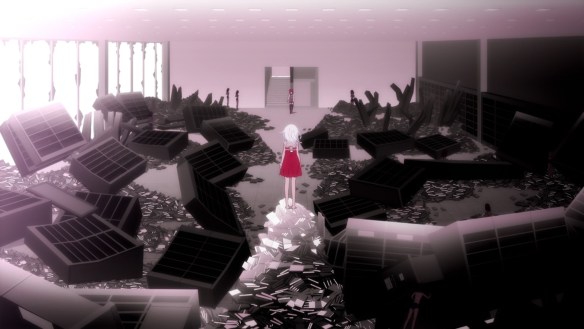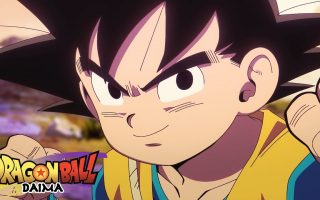Hello folks, and welcome back to Wrong Every Time. Today we are concluding Nadeko’s quest to pull herself back together, and hopefully come to love all the divergent personas that brought her to this point. Having recaptured Flirty Nadeko and Wrath Nadeko, she now finds herself facing off with God Nadeko, the medusa that once threatened all life in her town. With neither Kaiki’s guidance nor Yotsugi’s Unlimited Rulebook to assist her, she will have to confront one of the most powerful creatures in Monogatari history, and somehow convince her to help with Nadeko’s embarrassing romance manga.
It’s not unusual to come to hate your own past self. In fact, it can often be quite comforting to blame your former identity for all the failings of your current life, or to at least feel embarrassed regarding the ignorance, insecurity, or audacity that inspired your prior forms of self-expression. The passion that inspired one era of your life can seem embarrassing or naive from a further vantage point – but as Kaiki told Nadeko once before, passion is inherently embarrassing. Commitment is embarrassing. Staking your claim in the world, stating what you truly desire and how hard you’d work to acquire it, is always kinda embarrassing. We cling to indifference or even nihilism as defensive measures, knowing only that to admit we care is to invite mockery, to let others poke holes in our shameful ambitions.
But that’s no way to live. To truly thrive we must embrace the embarrassment of committing fully to our passions, and to understand ourselves we must forgive and embrace our past selves, knowing that their passion is still a part of us. The girl who used meekness as a shield, the girl who danced for the crowd’s applause, the girl who hated that crowd for their shallow adoration – all of those were earnest forms of Nadeko, each trying their best to get along in a world that tells us the only true crime is to wear no mask at all. If Nadeko wants to create stories that speak from the heart, she must first learn to embrace her own – and in forgiving these rambling Nadekos, she might just see the path forward a little more clearly. Let’s return to the final battle!
Episode 6
We begin where we left off, with God Nadeko cackling amidst the ruin of this bookshop as Current Nadeko bravely takes the stage
But then there are two Current Nadekos! With the other shikigamis now working for her, she can at least disguise herself among them
Ooh, some excellent animation and energetic camerawork as the Current Nadekos evade God Nadeko’s spears. This hard-edged geometric layout is effective in facilitating camera movement, and Monogatari’s general mixed-media approach makes the CG backdrop feel less intrusive. Oishi pushed that effect to its absolute limit in Kizu, making a digital nightmare of Koyomi’s environment
Our first Current Nadeko is defeated, while the second manages to bat the spear outside the building. Gotta assume that one’s Wrath Nadeko
Hah, love that every one of her snake eyes gets a mini-lens flare for this portrait shot
But Current Nadeko is actually neither of her avatars – she in truth hid among the Bloomer Nadekos, no longer afraid to cloak herself among even the most embarrassing relics of her past
Leave it to Monogatari to conclude the final battle before the OP. We’ve got a lot of self-analysis to get to!
Yotsugi notes that Nadeko’s creation ability isn’t far off from Kiss-Shot’s. It seems that Nadeko still possesses a great deal of supernatural power; no wonder the specialists are still questioning whether she can left in peace
“Current Nadeko as a character was activated at the same time.” Another sign of her evolving understanding of self – she understands even her current persona as a stage in her development, not the “final truth” of her identity. She was previously desperate to claim a real, lasting identity, but having come to accept the quirks of her previous selves, she no longer feels so anxious about about the idea of her current identity being similarly “incorrect” in some way
“In the end, I am how I am now because that’s what I used to be like.” Don’t blame your past selves for failing to embody all your current values – thank them for traversing the difficult path that has brought you this far, and led you to this current understanding of self
Yotsugi assures her that she has changed. Her willingness to put herself in such a dangerous position proved her to be different from God Nadeko – she is willing to take risks now, and no longer hiding her true desires in shame
Nadeko is both extremely happy to receive this compliment, and sad at its implication her past selves have faded away. She has come to truly love them
“If you are to commemorate the shikigami who stood in for you, why don’t you take this experience, these emotions, and draw them so you can preserve it?” Nadeko has the privilege of being able to memorialize her past truths in her art. Knowledge of the self is one of the key prerequisites for writing living characters in fiction; if you can’t step outside of your own perspective and embrace, even love the internal truth of another, all of your characters will be inherently tethered to your own values and voice
These sheets of paper containing her various past selves are framed as a circle, a spiral staircase carrying Nadeko up towards the future
Yotsugi states she’ll stay to clean up, and that Nadeko should go where she is needed. This arc also serves as a nice quiet coda for the previous adventure, emphasizing how close these two have grown
And then Ougi shows up in Koyomi’s friggin’ yellow beetle
Since Koyomi has embraced Ougi, Ougi appears to have shifted from the most negative possible interpretation of Koyomi’s self-sacrificing instinct (actively creating disasters to give Koyomi a chance to sacrifice himself) to the most noble possible interpretation (independently assisting in and resolving oddity crises, thereby letting Koyomi himself continue to live his life)
Nadeko ties this story all the way back to the beginning, reflecting on how Oshino immediately pinned her as someone hiding within the identity of “victim”
“By continuing to be the victim forever, I made everyone around me the wrongdoers.” Shielding yourself with your sense of victimization can ultimately justify anything, as far too many real-world examples attest. For Nadeko, everything leading up to her brutal violence as a god was justified by her identity as a victim
“What does that have to do with the present? These are all stories of the past.” Ougi is still circuitous, demanding Nadeko complete the circle by acknowledging herself that these instincts are still a part of her
“All of this is about the present.” And Nadeko rises to the occasion, admitting that even now she still saw “Meek Nadeko” as a victim with no agency of her own, thus blinding Current Nadeko to her role within the shikigami escapees
“Meek Nadeko wanted to buy some time to do what she really wanted to do.” What did you actually want from life, back when you were so afraid of responsibility, so skilled at avoiding blame that you made it your whole identity? I love this – in order to commit fully to her current path in life, she must first acknowledge and embrace the desires that began her path to this point, that she refused to admit to in the first place
A silhouette of Renai Circulation Nadeko trudging forward, the ghost Current Nadeko is seeking
Ougi actually drives her to Senjougahara’s house, so she can finally kill off her romantic rival. Love Nadeko embracing her Wrath Nadeko side in admonishing Ougi for this nonsense
Nadeko actually gets so mad they have to muffle her vocal take so she doesn’t fuck up the microphone. Excellent work, Hana Kanazawa
Current Nadeko instead finds Meek Nadeko outside the high school, in the snakeskin-reminiscent jacket combo she began the series wearing
“That guy isn’t here anymore. Nobody stays as an eighth grader forever.” Words applicable to both Meek Nadeko and her current stasis-ridden self
“Waiting here won’t do you any good.” The desire uniting her past selves. She has to move past this moment, this love, this town
“Even if you waited forever, a prince won’t come riding a white horse.”
“Let’s go back to where everyone else is. Everyone is waiting for you.” Together, Current Nadeko and all the Nadekos she has been before will write their own way forward
“I’m so happy just pining for him. I don’t need anything else.” You will in time, Meek Nadeko. It might seem gallant to wait forever for a destined love, but tomorrow comes eventually, and you won’t feel better if you’re still standing where you started
“Is it gone? Is the future that boring? Did I turn into that kind of adult?” Meek Nadeko was as much of a person as any of these other identities, and Current Nadeko can sympathize with all of these feelings
“I promise you. I will fall in love with someone again. I promise you. I will not stop loving people.” She will not take her past selves’ passions for granted. She will embrace the sincere hopes within them
“I’ll chase my dreams, and I won’t learn my lesson and I’ll fall in love again.” God, this show absolutely floors me. It is ultimately so insistent we be kind, to each other of course, but also to ourselves. Don’t hate yourself for what you love. Find the beauty in your failures, and carry onward. Always make sure to keep living
“I’ll turn all your feelings into a story that sparks joy in people’s hearts.” Yep, got me crying again. Goddamnit Nadeko
“On this day, I grew up just a little.” Whew, what an arc
And we hit an early ED, which I assume means we’re diving right into the prologue of the next arc
“This is what you’d call an epilogue, as well as a prologue.” Ayep
Nadeko first visits Tsukihi, who explains she basically didn’t cover for Nadeko at all, and then Shinobu pops up
Shinobu is of course here to test if Nadeko’s matter-creation ability can build donuts. Sadly, the flavor of a supernatural donut is terrible
In typical Shinobu fashion, rather than apologizing for her prior assessment of Nadeko as nothing more than a cute face, she tells Nadeko to bring whatever scoundrel said such a thing to her for judgment
Shinobu teaches her how to use her ability, and then Gaen immediately sends Yotsugi with a new job for her. Manga aside, it seems being a part-time apparition specialist is definitely a part of Nadeko’s future
“She put value in your calmness when dealing with trouble.” Crucial that it’s not some arbitrary power like her initial “being cute” that made Nadeko a potentially valuable partner, it’s the confidence and maturity she has cultivated, the same qualities Shinobu was praising
Yotsugi claims she was just acting as a talent scout, but Nadeko sees right through her. “Ononoki is a very bad liar.”
And Done
Thus Nadeko reacquires all of her past selves, and discovers a new path forward in the bargain. An alternately whimsical and poignant arc, taking full advantage of Nadeko’s uniquely wandering path to explore how every digression in life offers its own distinctive truth, reflecting aspects of ourselves that we might deny or regret, but which all ultimately fit into the grand, irregular work-in-progress that is our perpetually evolving identity. Embracing the truths of her past selves has made Nadeko far more flexible and self-assured, capable of calling on her defiant wrath, her people-pleasing charm, and even the hopeless longing that defined her first arrival in Monogatari, a passion that will surely breathe life into her unabashedly sentimental manga. “I promise you, I will not stop loving people” instantly secures a place among Monogatari’s iconic moments, those sequences where all the artifice and self-analysis peels away, and what remains is the most sincere possible articulation of our collective wish for love and happiness. Fine work, Sengoku Nadeko.
This article was made possible by reader support. Thank you all for all that you do.




